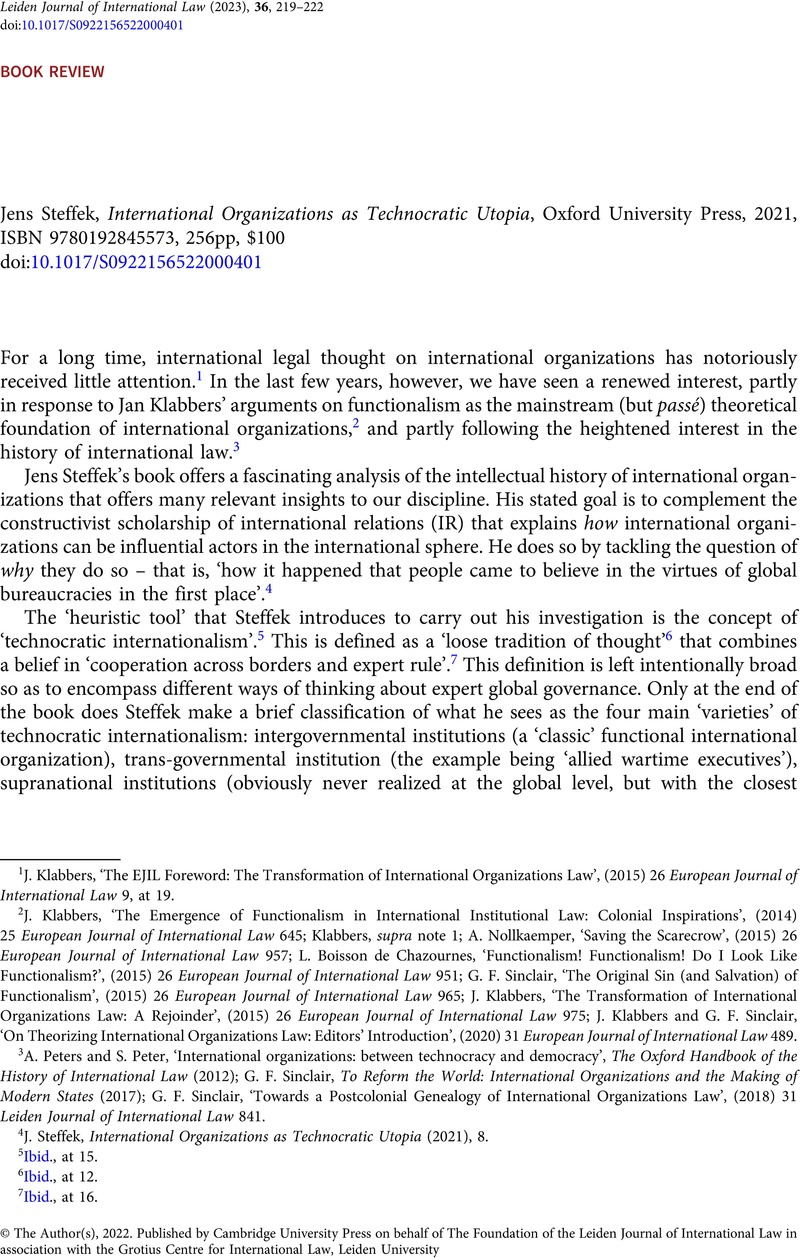No CrossRef data available.
Article contents
Jens Steffek, International Organizations as Technocratic Utopia, Oxford University Press, 2021, ISBN 9780192845573, 256pp, $100
Review products
Published online by Cambridge University Press: 27 September 2022
Abstract

- Type
- Book Review
- Information
- Copyright
- © The Author(s), 2022. Published by Cambridge University Press on behalf of The Foundation of the Leiden Journal of International Law in association with the Grotius Centre for International Law, Leiden University
References
1 J. Klabbers, ‘The EJIL Foreword: The Transformation of International Organizations Law’, (2015) 26 European Journal of International Law 9, at 19.
2 J. Klabbers, ‘The Emergence of Functionalism in International Institutional Law: Colonial Inspirations’, (2014) 25 European Journal of International Law 645; Klabbers, supra note 1; A. Nollkaemper, ‘Saving the Scarecrow’, (2015) 26 European Journal of International Law 957; L. Boisson de Chazournes, ‘Functionalism! Functionalism! Do I Look Like Functionalism?’, (2015) 26 European Journal of International Law 951; G. F. Sinclair, ‘The Original Sin (and Salvation) of Functionalism’, (2015) 26 European Journal of International Law 965; J. Klabbers, ‘The Transformation of International Organizations Law: A Rejoinder’, (2015) 26 European Journal of International Law 975; J. Klabbers and G. F. Sinclair, ‘On Theorizing International Organizations Law: Editors’ Introduction’, (2020) 31 European Journal of International Law 489.
3 A. Peters and S. Peter, ‘International organizations: between technocracy and democracy’, The Oxford Handbook of the History of International Law (2012); G. F. Sinclair, To Reform the World: International Organizations and the Making of Modern States (2017); G. F. Sinclair, ‘Towards a Postcolonial Genealogy of International Organizations Law’, (2018) 31 Leiden Journal of International Law 841.
4 J. Steffek, International Organizations as Technocratic Utopia (2021), 8.
5 Ibid., at 15.
6 Ibid., at 12.
7 Ibid., at 16.
8 Ibid., at 183–5.
9 Ibid., at 180–3.
10 Ibid., at 11.
11 Ibid., at 48–9; Klabbers, supra note 2.
12 Steffek, ibid., at 185.
13 Klabbers, supra note 2, at 976.
14 Klabbers, supra note 1, at 12.
15 J. Klabbers, ‘Two Concepts of International Organization’, (2005) 2 International Organizations Law Review 277, at 279–80; J. Klabbers, ‘The Normative Gap in International Organizations Law: The Case of the World Health Organization’, (2019) 16 International Organizations Law Review 272.
16 R. Howse, ‘From Politics to Technocracy - and Back Again: The Fate of the Multilateral Trading Regime Symposium: The Boundaries of the WTO’, (2002) 96 American Journal of International Law 94; Peters, supra note 3; J. E. Alvarez, The Impact of International Organizations on International Law (2016), at 190–261.
17 Peters, supra note 3.
18 Steffek, supra note 4, at 193.
19 Ibid., at 14.


